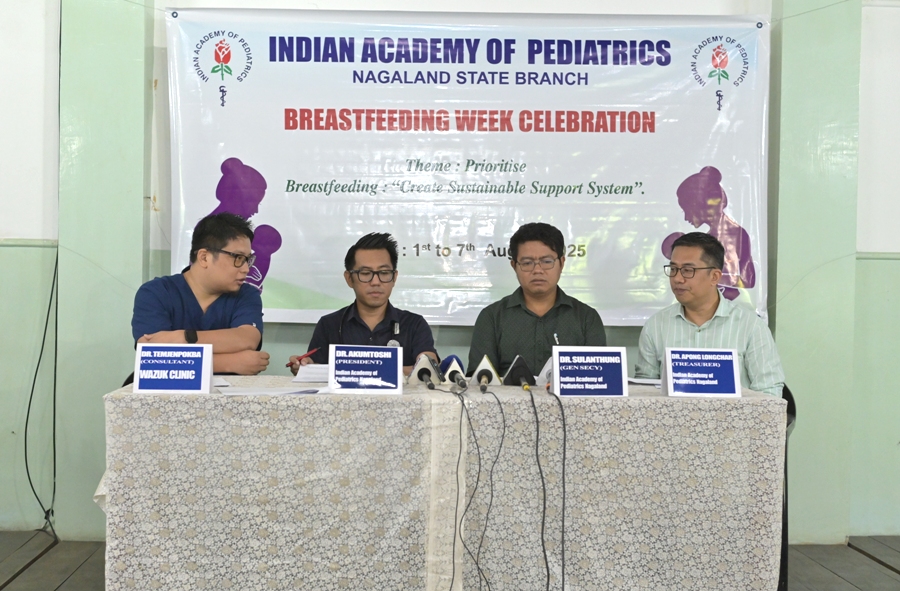SATURDAY, NOVEMBER 29, 2025
- Home
- Nagaland paediatricians advocate for breastfeeding support infrastructure in public spaces
Nagaland paediatricians advocate for breastfeeding support infrastructure in public spaces
Nagaland paediatricians urge creation of private breastfeeding spaces in public areas to support mothers and promote infant health.
Share

DIMAPUR — The Nagaland Chapter of Indian Academy of Paediatrics (IAP) on Thursday called for creation of private and designated spaces in public areas such as airports, offices, railway stations, and transport hubs to support breastfeeding mothers.
Addressing a press conference at Zion Hospital in Dimapur, Dr. Akumtoshi, President of IAP Nagaland Chapter, said that the need to provide appropriate infrastructure is part of building long-term support systems to make breastfeeding more practical and accessible.
Many hospitals in Nagaland already provide such spaces, and some churches have also begun to accommodate breastfeeding mothers, he said.
The press conference was held as part of the observance of World Breastfeeding Week, which is marked globally from August 1 to the 7th. This year’s theme is ‘Prioritise Breastfeeding: Create Sustainable Support.’
Dr. Akumtoshi said that breastfeeding improves intelligence quotient, strengthens immunity, and should be supported through better systems. He reiterated the World Health Organisation's recommendation of exclusive breastfeeding for the first six months and continuing up to two years and beyond.
“Instead of discouraging mothers and giving stress, it is important to create conducive environment and support system for breastfeeding mothers to boost their mental and physical strength,” he said.
Also read exclusive: Nagaland’s war on drugs needs compassion, not criminalisation—Stakeholders
Dr. Temjenpokba Longkumer, a paediatrician at Wazuk Clinic, said that breastfeeding provides complete and natural nutrition for babies, supports brain development, strengthens the immune system, lowers the risk of long-term health problems, and is easier for infants to digest.
He also noted that breast milk is species-specific and baby-specific. For mothers, he said, breastfeeding helps with postnatal physical recovery, reduces the risk of ovarian and breast cancers, high blood pressure, heart disease, and type 2 diabetes, supports weight management, and encourages emotional bonding.
Elaborating on the adaptability of breast milk, Dr. Apong Longchar explained that “foremilk”, which is produced at the beginning of a feed, is watery and rich in lactose, while “hindmilk”, produced towards the end of a feed, is rich in fats needed for brain development. He added that breast milk composition can vary even within a single feeding session and throughout the day.
He addressed common misconceptions, noting that early milk production, known as colostrum, is naturally limited in volume but rich in nutrients. He added that while formula milk is better than substitutes like cow’s milk, “nothing is better than mother's own milk for the baby.”
“Breastfeeding doesn't always come naturally, especially for first-time mothers, and often requires support. While some discomfort is normal, most issues are temporary,” he said, debunking the myth that mothers should stop breastfeeding once solid food is introduced.
Read more: High Court dismisses petitions challenging regularisation of Covid-era doctors in Nagaland
Additionally, he clarified that breastfeeding does not weaken mothers; instead, it can contribute to their overall health and well-being.
General Secretary Dr. Sulanthung stated that while no formal studies have been conducted in Nagaland, clinical experience suggests the situation aligns with national trends. Nationally, only 54.9% of children are exclusively breastfed for the first six months, and just 41.6% of newborns are breastfed within the first hour of birth despite 79% of deliveries occurring in institutions.
He said gaps in breastfeeding practices arise from a lack of support, persistent misconceptions, and institutional shortcomings—such as lack of awareness among staff or privacy for mothers. “This is the reason why this year’s theme is on prioritising breastfeeding to create a sustainable support system,” he said.
Dr. Sulanthung noted that while breastfeeding is generally beneficial, there are certain medical conditions such as cancer or other serious illnesses where alternative feeding options may be required. However, he said that mothers on minor medications can often continue breastfeeding. In all cases, it is important that mothers consult their healthcare providers for individualised guidance.
On the question of breastfeeding by HIV-positive mothers, the paediatricians said that those who are on antiretroviral therapy (ART) and have an undetectable viral load can safely breastfeed. They also emphasised the importance of antenatal check-ups during pregnancy to support both mother and child.

